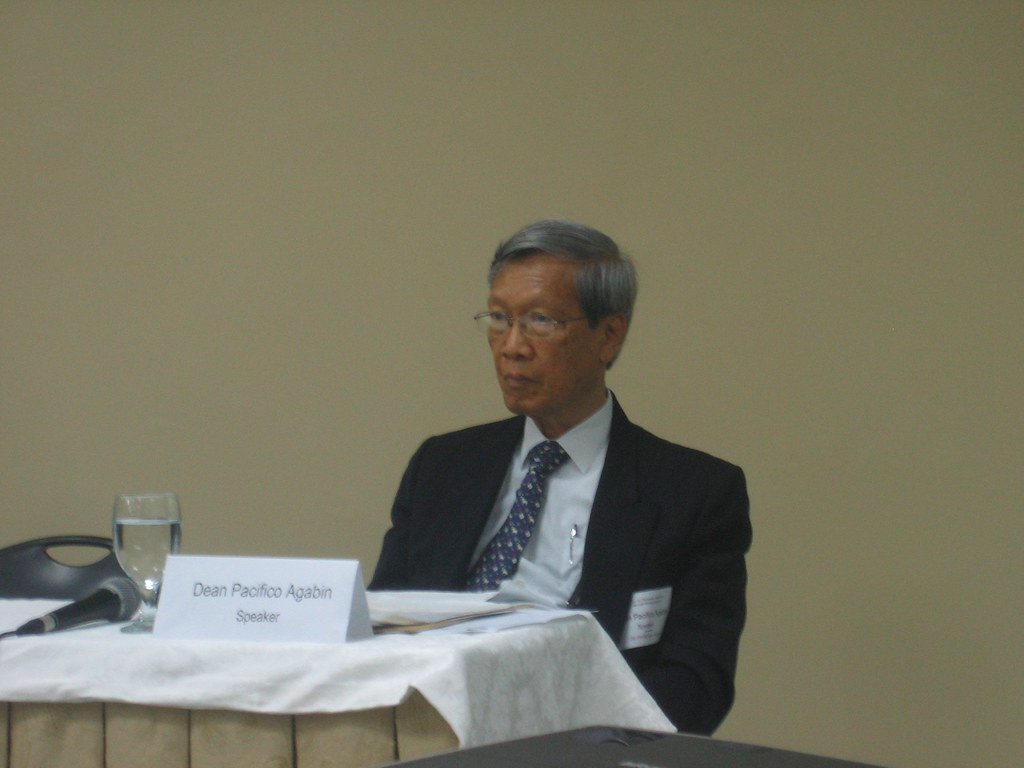The forum was moderated by Mr. Gil A. Santos, and the reactors were Atty. Jose Malvar of the Citizens Crime Watch, Mr. Jude Esguerra, Executive Director of the Institute for Popular Democracy, Ms. Leah Navarro, Spokesperson of the Black and White Movement, and Justice Manuel Lolong Lazaro, former Secretary of President Marcos.

By way of Introduction, Dean Agabin read a short paper he wrote and submitted to the House of Representatives. After what had happened regarding the railroading of HR1109, apparently, he said, "they didn't read my paper."
"I believe that it is a laudable move for the Committee (on Constitutional Revision) to await a Supreme Court ruling on these issues, notwithstanding that its Members, most of whom are lawyers, have their own opinion on these questions. As lawyers, the Committee Members would like to make sure that the moves they will take will be stamped with legitimacy by the Supreme Court."
"Legitimacy in the House," as it is aptly entitled, gives "three distinct concepts of legitimacy" in context of Constitutional Law, regardless whether it concerns the House, the Supreme Court, or even the Executive.
First is legal, then sociological, then moral legitimacy. He says that "when legitimacy functions as a legal concept, it is gauged by legal norms. As a sociological concept, a constitutional act is legitimate insofar as it is deserving of respect by the citizenry. The last criteria is moral, which refers to the moral justification for claims of authority asserted in the name of the law [See Richard Fallon, Jr., 'Legitimacy and the Constitution, 118 Harvard Law Review 1789 (2005)]."
"Legal or judicial legitimacy can be stamped by the Supreme Court. That is its primary function. But, as representatives of the people, the Members of the Committee know very well that legitimacy in constitutional law does not stand on the single foundation of judicial (or legal) legitimacy. It rests much more on sociological legitimacy or acceptance of the people. The U.S. Supreme Court realized this very well when it said:
"The Court cannot buy support for its decisions by spending money and, except to a minor degree, it cannot independently coerce obedience to its decrees. The Court's power lies, rather, in its legitimacy, a product of that substance and perception that shows itself in the people's acceptance of the Judiciary as fit to determine what the Nation's law means and declare what it demands. xxx But even when justification is furnished by apposite legal principle, something more is required. Because not every conscientious claim of principled justification will be accepted as such xxx, the court's legitimacy depends on making legally principled decisions under circumstances in which their principled character is sufficiently plausible to be accepted by the Nation [Planned Parenthood of SE Pennsylvania v. Casey, 505 U.S. 833, 864-865 (1992)]."
In short, Dean Agabin explains, "to the extent that the Supreme Court is perceived to be manipulated or politicized, its stamp of legitimacy is wiped out."
The urgent question I pose now, Is the passage of the HR 1109 legitimate? But behind that, given that the congressmen are brilliant lawyers, why would they waste the time and resources of this nation for a passage of even an unconstitutional resolution to convene as constituent assembly? Is this a charade to cover up something they're cooking?
Technorati Tags: bong, AIM, Dean Pacifico Agabin, Conass, Charter Change, Legitimacy in the House

No comments:
Post a Comment